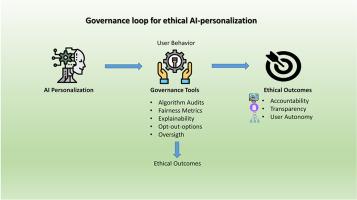AI-powered personalization in e-commerce: Governance, consumer behavior, and exploratory insights from big data analytics
IF 12.5
1区 社会学
Q1 SOCIAL ISSUES
引用次数: 0
Abstract
AI-powered personalization is revolutionizing digital commercial platforms, presenting a plethora of opportunities and challenges related to governance, ethical considerations, and consumer behavior. This research explores the effects of algorithmic personalization on consumer behavior by employing a log-log regression analysis on transaction-level datasets obtained from Amazon during the period spanning 2018 to 2022. By examining the elasticity of consumer spending in response to price and quantity changes, it is shown that both variables exhibit nearly unitary responses, indicating that spending patterns in AI-personalized environments follow strong and consistent elasticity trends. While direct exposure to personalization signals is not measured, the behavioral patterns observed are consistent with personalization effects typical of platforms like Amazon. The present investigation, which applies a reduced-form elasticity model, situates the interconnection between personalization systems and the broader societal context. The findings provide compelling evidence that adaptive personalization technologies are associated with shifts in consumer expenditure behaviors but also user autonomy and the dynamics of digital trust. The model identifies behavioral regularities that support interpretive insights into AI-mediated commerce. Analyzing from a governance perspective, the findings reveal notable deficiencies in both transparency and regulatory frameworks, particularly regarding the fairness and ethical management of personal data. With algorithmic personalization growing more inscrutable, this paper advocates for an interdisciplinary methodology that synthesizes behavioral insights with accountable technology governance. Ultimately, this study contributes to the ongoing discussions concerning the influence of AI on market dynamics and the promotion of socially responsible innovation within the digital economy.

电子商务中人工智能驱动的个性化:治理、消费者行为和大数据分析的探索性见解
人工智能驱动的个性化正在彻底改变数字商业平台,带来了与治理、道德考虑和消费者行为相关的大量机遇和挑战。本研究通过对2018年至2022年期间从亚马逊获得的交易级数据集进行对数回归分析,探讨了算法个性化对消费者行为的影响。通过检查消费者支出对价格和数量变化的响应弹性,结果表明,这两个变量都表现出近乎统一的响应,这表明人工智能个性化环境中的支出模式遵循强大而一致的弹性趋势。虽然没有测量直接接触个性化信号,但观察到的行为模式与亚马逊等典型平台的个性化效果一致。本研究采用简化形式弹性模型,定位个性化系统与更广泛的社会背景之间的联系。研究结果提供了令人信服的证据,表明自适应个性化技术与消费者支出行为的转变有关,也与用户自主性和数字信任的动态有关。该模型确定了支持对人工智能介导的商业的解释性见解的行为规律。从治理的角度分析,调查结果揭示了透明度和监管框架的显著缺陷,特别是在个人数据的公平性和道德管理方面。随着算法个性化变得越来越难以理解,本文提倡一种跨学科的方法,将行为洞察力与负责任的技术治理综合起来。最终,本研究有助于正在进行的关于人工智能对市场动态的影响和促进数字经济中对社会负责的创新的讨论。
本文章由计算机程序翻译,如有差异,请以英文原文为准。
求助全文
约1分钟内获得全文
求助全文
来源期刊

Technology in Society
Multiple-
CiteScore
17.90
自引率
14.10%
发文量
316
审稿时长
60 days
期刊介绍:
Technology in Society is a global journal dedicated to fostering discourse at the crossroads of technological change and the social, economic, business, and philosophical transformation of our world. The journal aims to provide scholarly contributions that empower decision-makers to thoughtfully and intentionally navigate the decisions shaping this dynamic landscape. A common thread across these fields is the role of technology in society, influencing economic, political, and cultural dynamics. Scholarly work in Technology in Society delves into the social forces shaping technological decisions and the societal choices regarding technology use. This encompasses scholarly and theoretical approaches (history and philosophy of science and technology, technology forecasting, economic growth, and policy, ethics), applied approaches (business innovation, technology management, legal and engineering), and developmental perspectives (technology transfer, technology assessment, and economic development). Detailed information about the journal's aims and scope on specific topics can be found in Technology in Society Briefings, accessible via our Special Issues and Article Collections.
 求助内容:
求助内容: 应助结果提醒方式:
应助结果提醒方式:


